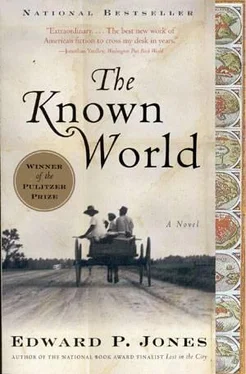In those first days after Henry bought Alice, the patrollers would haul her back to Henry’s plantation, waking him and Caldonia as one of them rode up on the porch and pounded on the black man’s front door with the butt of a pistol. “Your property out here loose and you just sleepin like everything’s fine and dandy,” they shouted to him, a giggling Alice sprawled before them in the dirt after they had run her back. “Come down here and find out about your property.” Henry would come down and explain again that no one, not even his overseer, had been able to keep her from roaming. Moses had suggested tying her down at night, but Caldonia would not have it. Alice was nothing to worry about, Henry said to the patrollers, coming down the steps in his nightclothes and helping Alice up from the ground. She just had half a mind, he said, but other than that she was a good worker, never saying to the two or three white patrollers who owned no slaves that a woman of half a mind had been so much cheaper to buy than one with a whole mind. Two hundred and twenty-eight dollars and two bushels of apples not good enough to eat and only so-so enough for a cider that was bound to set someone’s teeth on edge. The patrollers would soon ride away. “This is what happens,” they said among themselves back on the road, “when you give niggers the same rights as a white man.”
Toward the middle of her third week as Henry and Caldonia’s property, the patrollers got used to seeing Alice wander about and she became just another fixture in the patrollers’ night, worthy of no more attention than a hooting owl or a rabbit hopping across the road. Sometimes, when the patrollers had tired of their own banter or when they anticipated getting their pay from Sheriff John Skiffington, they would sit their horses and make fun of her as she sang darky songs in the road. This show was best when the moon was at its brightest, shining down on them and easing their fear of the night and of a mad slave woman and lighting up Alice as she danced to the songs. The moon gave more life to her shadow, and the shadow would bounce about with her from one side of the road to other, calming the horses and quieting the crickets. But when they suffered ill humor, or the rain poured down and wetted them and their threadbare clothes, and their horses were skittish and the skin down to their feet itched, then they heaped curse words upon her. Over time, over those six months after Henry bought Alice, the patrollers heard from other white people that a crazy Negro slave in the night was akin to a two-headed chicken, or a crowing hen. Bad luck. Very bad luck, so it was best to try to keep the cussing to themselves.
The rainy evening her master Henry died Alice again stepped out of the cabin she shared with Delphie and Delphie’s daughter, Cassandra. Delphie was nearing forty-four years old and believed that God had greater dangers in store for everybody than a colored woman gone insane, which was what she told her daughter, who was at first afraid of Alice. Alice came out that evening and saw Elias standing at his door with the whittling knife and the pinewood in his hands, waiting for the rain to end. “Come on with me,” she sang to Elias. “You just come on with me now. Come on, boy.” Elias ignored her.
After she came back from watching Moses in the patch of woods, Alice went back down the lane and out to the road. The muddy road gave her a hard way but she kept on. Once on the road, she veered away from Henry’s place and began to chant, even more loudly than when she was on her master’s land.
Lifting the front of her frock for the moon and all to see, she shimmied in the road and chanted with all her might:
I met a dead man layin in Massa lane
Ask that dead man what his name
He raised he bony head and took off his hat
He told me this, he told me that.
Augustus Townsend, Henry’s father, finally bought himself out of slavery when he was twenty-two. He was a carpenter, a woodcarver whose work people said could bring sinners to tears. His master, William Robbins, a white man with 113 slaves to his name, had long permitted Augustus to hire himself out, and Robbins kept part of what he earned. The rest Augustus used to pay for himself. Once free, he continued to hire himself out. He could make a four-poster bed of oak in three weeks, chairs he could do in two days, chiffoniers in seventeen days, give or take the time it took to get the mirrors. He built a shack-and later a proper house-on land he rented and then bought from a poor white man who needed money more than he needed land. The land was at the western end of Manchester County, a fairly large slip of land where the county, as if tired of pushing west, dipped abruptly to the south, toward Amherst County. Moses, “world stupid” as Elias was to call him, would get lost there in about two months, thinking that he was headed north. Augustus Townsend liked it because it was at the farthest end of the county and the nearest white man with slaves was a half a mile away.
Augustus made the last payment for his wife, Mildred, when she was twenty-six and he was twenty-five, some three years after he bought his own freedom. An 1806 act of the Virginia House of Delegates required that former slaves leave the Commonwealth within twelve months of getting their freedom; freed Negroes might give slaves too many “unnatural notions,” a delegate from Northampton County had noted before the act was passed, and, added another delegate from Gloucester, freed Negroes lacked “the natural controls” put on a slave. The delegates decreed that any freed person who had not left Virginia after one year could be brought back into slavery. That happened to thirteen people the year of Augustus’s petition-five men, seven women, and one child, a girl named Lucinda, whose parents died before the family could get out of Virginia. Based primarily on his skills, Augustus had managed to get William Robbins and a number of other white citizens to petition the state assembly to permit him to stay. “Our County-Indeed, our beloved Commonwealth-would be all the poorer without the talents of Augustus Townsend,” the petition read in part. His and two other petitions for former slaves were the only ones out of twenty-three granted that year; a Norfolk City woman who made elaborate cakes and pies for parties and a Richmond barber, both with more white customers than black, were also permitted to stay in Virginia after freedom. Augustus did not seek a petition for Mildred his wife when he bought her freedom because the law allowed freed slaves to stay on in the state in cases where they lived as someone’s property, and relatives and friends often took advantage of the law to keep loved ones close by. Augustus would also not seek a petition for Henry, his son, and over time, because of how well William Robbins, their former owner, treated Henry, people in Manchester County just failed to remember that Henry, in fact, was listed forever in the records of Manchester as his father’s property.
Henry was nine when his mother Mildred came to freedom. That day she left, a mild day two weeks after harvest, she walked holding her son’s hand down to the road where Augustus and his wagon and two mules were waiting. Rita, Mildred’s cabin mate, was holding the boy’s other hand.
At the wagon, Mildred sank to her knees and held on to Henry, who, at last realizing that he was to be separated from her, began crying. Augustus knelt beside his wife and promised Henry that they would be back for him. “Before you can turn around good,” he said, “you be comin home with us.” Augustus repeated himself, and the boy tried to make sense of the word home . He knew the word, knew the cabin with him and his mother and Rita that the word represented. He could no longer remember when his father was a part of that home. Augustus kept talking and Henry pulled at Mildred, wanting her to go back onto William Robbins’s land, back to the cabin where the fireplace smoked when it was first lit. “Please,” the boy said, “please, les go back.”
Читать дальше












